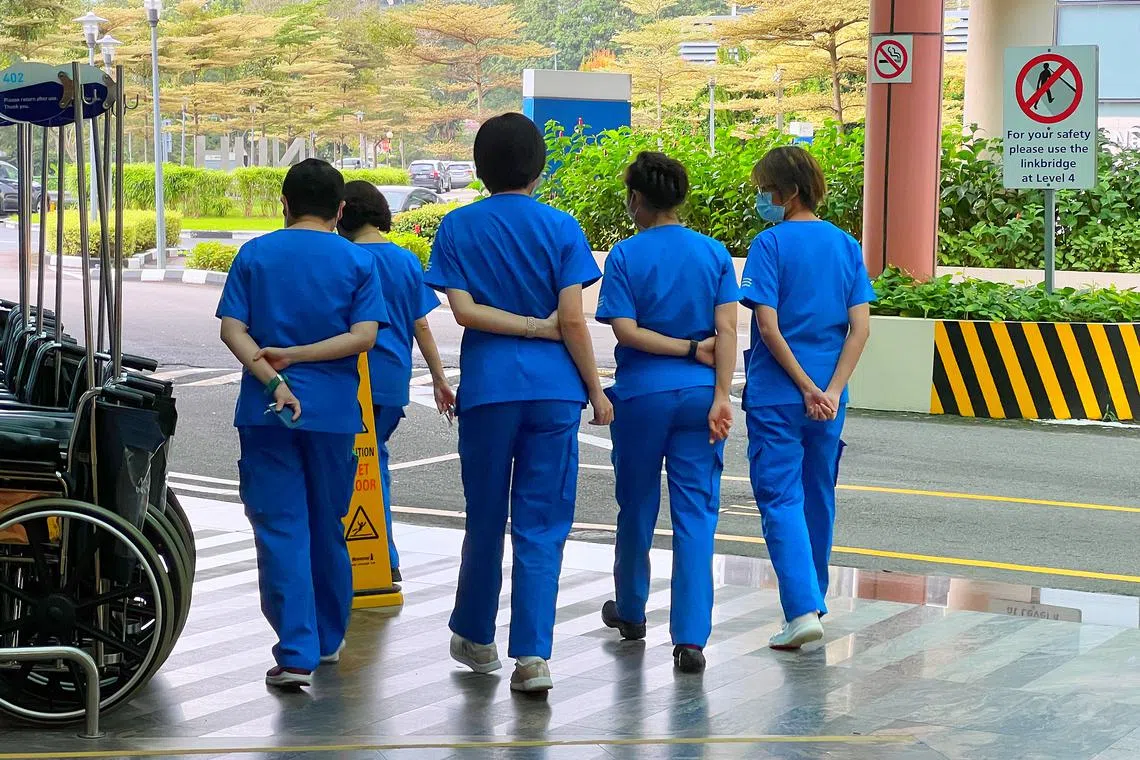Covid-19’s greatest lesson: Better to be prepared than cooperate after crisis erupts
Sign up now: Get ST's newsletters delivered to your inbox

The past three years have shown how countries and organisations can work together for the common good.
ST PHOTO: MALCOLM MCLEOD
SINGAPORE – The greatest lesson of the Covid-19 pandemic is that it is more important to be ahead of the curve than working together when a crisis unfolds.
Opening the 7th World One Health Congress on Monday, President Halimah Yacob said that with global interconnectivity, diseases spread more quickly than ever before.
But the same interconnectivity also leads to greater cooperation that “works positively and powerfully for the global community”.
“It has been increasingly apparent over the past few years that humans, animals and the environment are closely interconnected, and they constantly influence the health and well-being of one another,” she told the 1,400-strong audience at the Sands Expo and Convention Centre.
There were another 1,000 virtual participants attending the congress, which is held in a different country each time. This year, the five-day event is organised by the SingHealth Duke-NUS Global Health Institute.
Among the 120 speakers from 60 countries is Dr Christopher Elias, president for global development at the Bill & Melinda Gates Foundation. The topics span human, animal, food and environment sciences.
The past three years have also shown how countries and organisations can work together for the common good.
Said Madam Halimah: “This included coordinated efforts to restore supply chains, repatriate citizens who were stuck overseas, or rapidly develop Covid-19 vaccinations and treatments.
“Healthcare systems exchanged new innovations and best practices, scientists shared research findings and genomic sequences of the virus strains, and governments supported vaccine multilateralism initiatives like Covax to enable the vaccination of populations at a remarkable speed to mitigate the risk of severe illness.”
Singapore, too, played a part, with researchers and scientists helping to maintain the genomic database for the virus and developing test kits that were deployed to other countries.
Even as this pandemic is winding down, the world has to start preparing for the next Disease X, which might be even more ravaging. “Let me touch on three key areas where such cooperation is crucial: first, in detecting emerging threats; second, in addressing prevalent diseases; and finally, in facilitating knowledge-sharing to strengthen the robustness of health systems,” said Madam Halimah.
The President mentioned Singapore’s recently launched Programme for Research in Epidemic Preparedness and Response.
With a budget of $100 million over five years, it seeks to support and strengthen essential research capabilities, translational platforms and expertise that could be harnessed to detect, respond to, and contain future infectious disease outbreak threats.
The programme is also establishing regional collaborative networks, which Madam Halimah says are critical to mitigate and contain future disease threats.
Another research initiative here is in precision medicine, which can “transform healthcare and improve patient outcomes through new insights into the Asian genome and through data-driven healthcare solutions”.
The SG10K Health project, which sequenced the genomes of 10,000 healthy Singaporeans from the three major ethnic groups, was completed in 2019. The results will be published by the end of 2022.
Beyond research, there is also knowledge-sharing through meetings, such as the World One Health Congress.
Madam Halimah said: “There are policymakers, top scientists, research teams, academics and research programme managers in our midst, which makes this event an opportune platform for like-minded and strategic discussions.”
She added that Singapore is committed to being part of the global health agenda and must encourage more of such activities, as well as continue investing talent and resources in these efforts.
In his opening remarks given virtually, World Health Organisation director-general Tedros Adhanom Ghebreyesus said: “About 70 per cent of all emerging pathogens have a zoonotic source. Irresponsible land use, deforestation and climate change all increase the risk of new pathogens spilling over from wildlife and domestic animals to humans. We can only truly make the world safer if we address these underlying drivers of epidemics and pandemics.”



